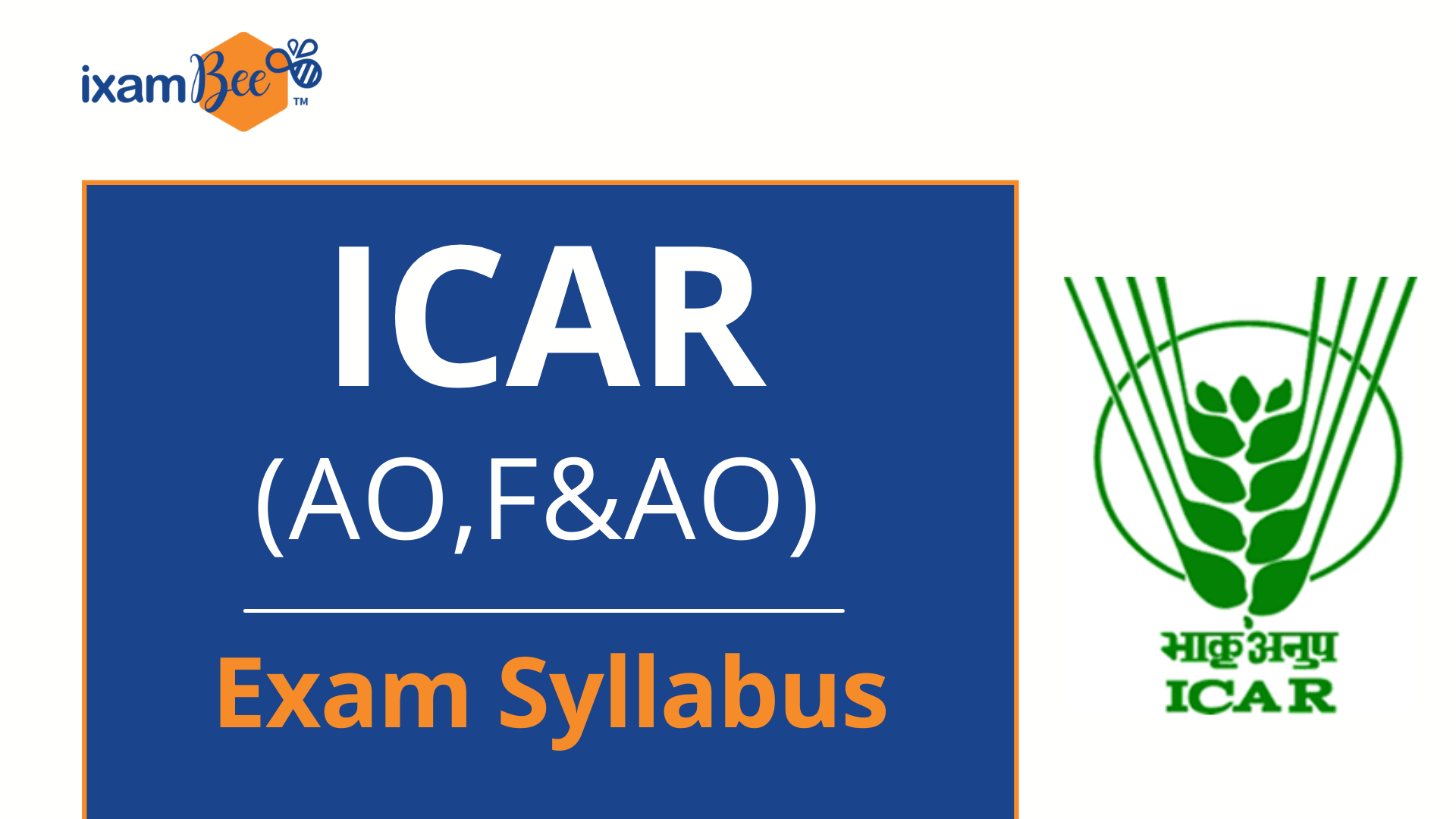- Details
- Popular Courses
- Ask Us?
ICAR AIEEA (P.G.) Agronomy Demo Course
- 100+ video lessons
- 5 Full-length mock tests
- 150+ study notes
- 5 Previous Year Question Paper
- 150+ Chapter tests
Syllabus

The ICAR recruitment 2025 is a golden opportunity for all the candidates who are interested in making a career in the government sector. You need to be aware of the complete information related to the ICAR exam as it may help you in having a full-proof study plan. To score well you need to be aware of the syllabus of all the sections covered under the ICAR recruitment exam. ICAR Tier 1 exam consists of 4 sections - General Knowledge, General Intelligence & Reasoning Ability, Arithmetical & Numerical Ability, Language Comprehension(Hindi/ English)
Syllabus
The detailed ICAR exam syllabus for Tier 1, which is common for AO, Finance and Account Officer can be deduced from the table below.
| Section | Topics |
|---|---|
| General Knowledge | Current events of national and international importance, History of India and Indian national movement, World History, Indian and World Geography – Physical, Social and economic, Indian Polity and Governance – Constitution, Political System, Panchayati Raj, Public Policy, Rights Issues, Economic and Social Development – Sustainable Development, Poverty, Inclusion, Demographics, Social Sector Initiatives, Agricultural and Geo-Cultural Development Issues, Human Rights, Social Conflicts, Disabilities, General Awareness specific to Structure & Functioning of ICAR, General Science and scientific research |
| General Intelligence & Reasoning Ability | Logical Reasoning and analytical Ability – Verbal and Non-Verbal (Analogies, Similarities, Differences, space visualization, visual memory, discrimination, observation, relationship, concepts, arithmetical reasoning, verbal and figure classification, arithmetical number series), Decision making and Problem Solving, General Mental ability |
| Arithmetical & Numerical Ability | Basic Numeracy (Number system, Simplification, Decimals, Fractions, L.C.M., H.C.F., Ratio & Proportion, Percentage, Average, Profit & Loss, Discount, Simple and Compound interest, Mensuration, Time and work, Time and Distance) (Class X level), Data Interpretation (charts, graphs, tables, data sufficiency etc.) (Class X level) |
| Language Comprehension ( English ) | Comprehension of Language and Writing Ability, Précis writing, Usage and Vocabulary, Short Essays, Translation • Interpersonal Skills including communication skills |
The syllabus of the ICAR Tier 2 exam for AO and Finance+ Account Officer is different. The Tier 2 of ICAR recruitment has four papers. The syllabus of Paper 1 and Paper 2 of ICAR Tier 2 for all the above-mentioned posts is the same while Paper 3 and Paper 4 have a different syllabus. Detailed ICAR AO and F&AO syllabus for Tier 2 is given in the table below.
ICAR Tier II Syllabus Paper I
| General awareness of Development of Economic, Social, Scientific & Cultural Fields, History & Geography of India and World |
|---|
| Indian culture will cover the salient aspects of Art Forms, literature and Architecture from ancient to modern times, Modern Indian history from about the middle of the eighteen century until the present – significant events, personalities, issues, The Freedom Struggle – its various stages and important contributions from different parts of the country, Post-independence consolidation and reorganization within the country, History of the world will include events from 18th century such as industrial revolution, world wars, redrawal of national boundaries, colonization, decolonization, political philosophies like communism, capitalism, socialism – their forms and effect on the society, Salient features of Indian Society, Diversity of India, Role of women and women’s organization, population and associated issues, poverty and development issues, urbanization, their problems and their remedies, Effects of globalization on Indian society, Social empowerment, communalism, regionalism & secularism, Salient features of world’s physical geography, Distribution of key natural resources across the world (including South Asia and the Indian sub-continent); factors responsible for the location of primary, secondary and tertiary sector industries in various parts of the world (including India), Important Geophysical phenomena such as earthquakes, Tsunami, Volcanic activity, cyclone etc., geographical features and their location- changes in critical geographical features (including water-bodies and ice-caps) and in flora and fauna and the effects of such changes |
ICAR Tier II Syllabus Paper II
| Constitution of India, Polity, Governance, Social Justice |
|---|
| Indian Constitution – historical underpinnings, evolution, features, amendments, significant provisions and basic structure, Functions and responsibilities of the Union and the States, issues and challenges pertaining to the federal structure, devolution of powers and finances up to local levels and challenges therein, Separation of powers between various organs dispute redressed mechanisms and institutions, Comparison of the Indian constitutional scheme with that of other countries, Parliament and State legislatures – structure, functioning, conduct of business. Power & privileges and issues arising out of these, Structure, organization and functioning of the Executive and the Judiciary – Ministries and Departments of the Government; pressure groups and formal/ informal associations and their role in the Polity, Salient features of the Representation of People’s Act. Appointment to various Constitutional post, powers, functions and responsibilities of various Constitutional Bodies, Statutory, regulatory and various quasi-judicial bodies, Government policies and interventions for development in various sectors and issues arising out of their design and implementation, Development processes and the development industry – the role of NGOs, SHGs, various groups and associations, donors, charities, institutional and other stakeholders, Welfare schemes for vulnerable sections of the population by the Centre and States and the performance of these schemes; mechanisms, laws, institutions and Bodies constituted for the protection and betterment of these vulnerable sections, Issues relating to development and management of Social Sector/ Services relating to Health, Education, Human Resources, Issues relating to poverty and hunger, Important aspects of governance, transparency and accountability, e governance – applications, models successes, limitations and potential; citizens charters, transparency & accountability and institutional and other measures, Role of Civil services in democracy, Role of Indian Council of Agricultural Research in Agricultural Sector, its Importance and various Implications. |
ICAR Tier II Syllabus Paper III
| Essay Writing |
|---|
| Candidates may be required to write essays on current international/ national events and other multiple topics like social, cultural, economic and political aspects about which a graduate level candidate is expected to be aware. They will be expected to keep close to the subject of the essay to arrange their ideas in orderly fashion, and to write concisely. An opinion may be given and candidate may have to submit his/ her arguments for and against the opinion and sum up in the end of his/ her views. Credit will be given for effective and exact expression |
ICAR Tier II Syllabus Paper IV
| Ethics, Integrity, Aptitude |
|---|
| Ethics and Human Interface: Essence, determinants and consequences of Ethics in-human actions; dimensions of ethics; ethics – in private and public relationships. Human Values – lessons from the lives and teachings of great leaders, reformers and administrators; role of family, society and educational institutions in inculcating values, Attitude: content, structure, function; its influence and relation with thought and behaviour; moral and political attitudes; social influence and persuasion, Aptitude and foundational values for Civil Service, integrity, impartiality and non partisanship, objectivity, dedication to public service, empathy, tolerance and compassion towards the weaker-sections, Emotional intelligence-concepts and their utilities and application in administration and governance, Contributions of moral thinkers and philosophers from India and world, Public/ Civil service values and Ethics in Public administration: Status and problems; ethical concerns and dilemmas in government and private institutions; laws, rules, regulations and conscience as sources of ethical guidance; accountability and ethical governance; strengthening of ethical and moral values in governance; ethical issues in international relations and funding; corporate governance, Probity in Governance: Concept of public service; Philosophical basis of governance and probity; Information sharing and transparency in government, Right to Information, Codes of Ethic, Codes of Conduct, Citizen’s Charters, Work culture, Quality of service delivery, Utilization of public funds, challenges of corruption, Case studies on above issues. |
ICAR Tier II Syllabus Paper IV Finance
| Commerce & Business Economics |
|---|
| This paper will cover the topics like Accounting, Financial Accounting, Auditing, Business Organization, Cost Accounting, Taxation, Financial Institutions, commonly taught in the Degree Course of Indian Universities/ Institutes. |
Financing/ Accounting
|
Cost Accounting
|
Taxation
|
Auditing
|
Foundation of Indian Business
|
Business Enterprises
|
The process of Management
|
Financial Markets and Institutions
|
Books
Before you start making your ICAR exam preparation plan, one basic thing that remains the same in all cases is good quality study material i.e. high-quality books. The right book can help you to pass the ICAR exam with flying colours. Though several books are available in the market you should choose the books by going through the content. To help you out in this, you can refer to the list given below.
| Subjects | Books | Author / Pulisher |
|---|---|---|
| General Knowledge | Lucent General Knowledge | Lucent Publication |
| General Knowledge | Arihant Publication | |
| General Intelligence & Reasoning Ability | A modern approach to verbal & Non-verbal reasoning | R S Agarwal |
| Verbal & Non-Verbal Reasoning | S.Chand | |
| Arithmetical & Numerical Ability | Arithmetic Subjective and Objective for Competitive Examinations | R S Agarwal |
| Quantitative Aptitude for Competitive Examinations | R S Agarwal | |
| Fast Track Objective Arithmetic | Rajesh Verma | |
| Quicker Mathematics | BSC Publications | |
| English Language | English Comprehension | Wren & Martin |
| Word Power Made Easy | Norman Lewis | |
| Constitution of India, Polity, Governance, Social Justice | Indian Polity | M Laxmikanth |
| Introduction to the Constitution of India (21st Edition) | Durga Das Basu | |
| Our Constitution Paperback / Our Parliament | Subhash C. Kashyap |


